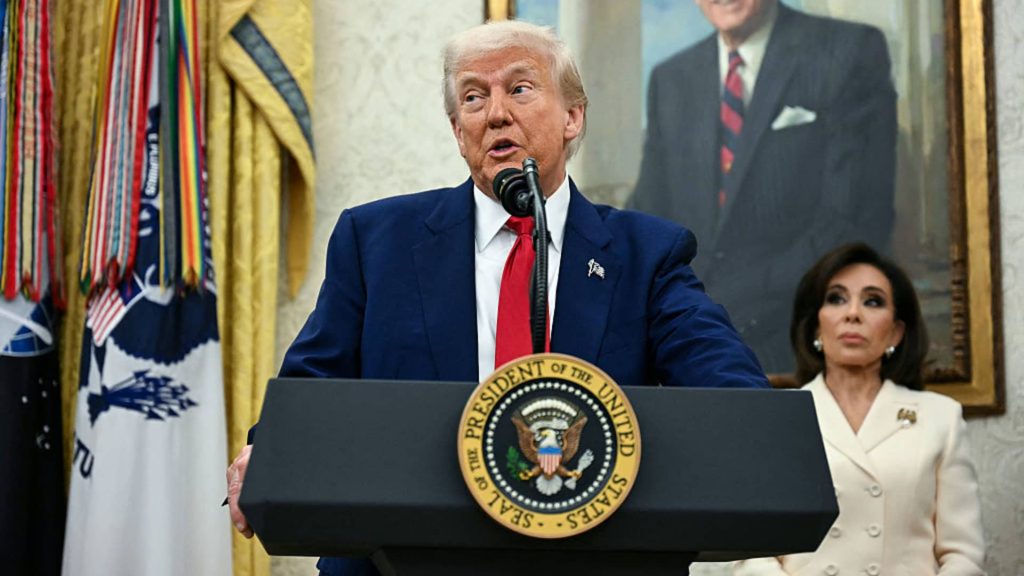President Donald Trump faced criticism recently over his fluctuating tariff threats, which some have derisively termed the “TACO trade,” referring to “Trump Always Chickens Out.” This phrase highlights a pattern in which Trump announces substantial new tariffs, negatively impacting the stock market, only to later retract or soften these measures, leading to a market rebound. In a press conference at the White House, Trump dismissed the criticism, asserting that his strategy has been key in advancing U.S. trade negotiations.
| Article Subheadings |
|---|
| 1) Definition of TACO Trade |
| 2) Trump’s Defense of Tariff Strategy |
| 3) Immediate Market Reactions |
| 4) History of Tariff Challenges |
| 5) Implications for Future Trade Relations |
Definition of TACO Trade
The term “TACO trade” was coined by a columnist at a leading financial publication to highlight President Trump’s inconsistent approach to tariffs. The acronym stands for “Trump Always Chickens Out,” which detail a pattern in which Trump announces heavy tariffs that initially cause market distress. However, following a brief period, he often retracts these promises, causing markets to recover. This approach reflects Trump’s fluctuating stance on trade policies and has serious implications for market stability. Critics argue that such a strategy undermines trust in U.S. trade commitments and potentially hampers long-term economic planning for businesses and investors alike.
Trump’s Defense of Tariff Strategy
In a recent press conference, Trump strongly defended his tariff strategy, framing it as a necessary negotiation tactic. He claimed that his announcements had led to positive responses from trading partners, specifically citing the European Union’s willingness to engage in renewed trade discussions. “After I did what I did, they said, ‘We’ll meet anytime you want,'” he stated regarding his dealings with the EU, which he recently targeted with a proposed 50% tariff. Trump’s assertion that he has not backed down on his tariffs was aimed at countering the TACO trade narrative. “You call that chickening out?” he challenged reporters, arguing that what was being viewed as a retreat was, in fact, a strategic negotiation.
Immediate Market Reactions
The immediate market response to Trump’s tariff announcements has been notably dramatic. On the day he publicly announced new tariffs on the EU, U.S. stocks saw a significant decline, reflecting investor anxiety surrounding trade tensions. However, when Trump later announced a postponement of the impending tariff deadline, stock markets rebounded sharply. On Tuesday, following this delay, major indexes rallied, highlighting the volatile link between Trump’s trade announcements and market performance. This back-and-forth has left many investors cautious, uncertain of how to interpret his future tariff decisions.
History of Tariff Challenges
Trump’s approach to tariffs is not unprecedented in his presidency; several instances exhibit similar tendencies. In April, he revealed plans for personalized “reciprocal” tariffs against nearly all nations, imposing rates as high as 30% or more on many goods. However, within a week, amid market turmoil, he scaled those rates back to 10% for a trial period of 90 days. This decisive reversal resulted in one of the most significant rallies on the stock market in recent history. A similar scenario unfolded with tariffs on China, where Trump’s imposition of tariffs spurred retaliation before he later moderated these rates alongside ongoing negotiations.
Implications for Future Trade Relations
The long-term impact of Trump’s tariff strategy remains uncertain. Analysts warn that his inconsistent tariff policies could strain relationships with international trade partners, leading to increased skepticism about U.S. credibility in trade negotiations. As Trump himself noted, the EU might question future deals, believing he may once again alter agreements. Additionally, the potential for bipartisan pushback within Congress grows as lawmakers seek to stabilize trade policies that could affect local economies and global markets. Therefore, while Trump’s negotiation methods may yield short-term gains, they may also create more significant challenges in building sustainable trade relations moving forward.
| No. | Key Points |
|---|---|
| 1 | Trump’s fluctuation in tariff threats has led to the term “TACO trade” to describe his perceived inconsistency. |
| 2 | Trump defends his tariff strategies as effective negotiation tactics rather than a retreat. |
| 3 | Immediate market reactions have shown volatility following Trump’s announcements, with stocks declining and then rebounding. |
| 4 | A historical review reveals a pattern in Trump’s tariff-related decisions, often leading to sudden reversals. |
| 5 | The uncertain nature of Trump’s trade policy may endanger future U.S.-EU relations and broader international trade agreements. |
Summary
The ongoing narratives surrounding President Trump’s tariff policies highlight significant tensions in U.S. trade negotiations. His approach has yielded mixed reactions from both the market and international partners, raising concerns about consistency and credibility in trade dealings. The implications of this TACO trade phenomenon extend beyond the immediate economic landscape, potentially shaping future relations with major trading partners.
Frequently Asked Questions
Question: What is the TACO trade?
The TACO trade refers to the pattern of President Trump’s tariff announcements followed by retractions, implying he “chickens out” after aggressive statements. It symbolizes the inconsistency perceived in his trade policies.
Question: How have the markets reacted to Trump’s tariff announcements?
Market reactions have been volatile; significant declines often follow new tariff announcements, while retractions or delays lead to sharp recoveries in stock prices, reflecting investor uncertainty.
Question: What historical precedents are there in Trump’s tariff strategies?
Past examples include the sudden announcement of high tariffs on numerous countries, followed by major reductions shortly after due to market turmoil, highlighting a consistent pattern in his handling of trade policies.
